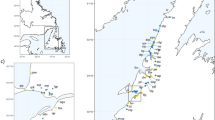Synopsis
The life history traits (longevity, growth, age at maturity, fecundity, egg size and length of breeding season) were compared for four sympatric sticklebacks (Gasterosteidae). Significant differences occurred for growth, longevity, age at maturity and length of breeding season, but not for egg diameters. Differences in life history traits are interpreted in terms of mechanisms permitting the coexistence of these closely-related territorial fish. Egg numbers were lowest inApeltes quadracus and highest inGasterosteus aculeatus withGasterosteus wheatlandi andPungitius pungitius having similar and intermediate fecundities.
Similar content being viewed by others
References cited
Bagenal, T.B. 1978. Eggs and early life history. pp. 165–201. In: T.B. Bagenal (ed.) Methods for Assessment of Fish Production in Fresh Waters, Blackwell Scientific Publications, Oxford.
Coad, B.W. & G. Power. 1973a. Observations on the ecology and phenotypic variation of the threespine sticklebackGasterosteus aculeatus L. 1758 and the blackspotted sticklebackG. wheadandi Putnam, 1867. (Osteichthytes: Gasterosteidae) in Amory Cove, Québec. Can. Fld. Naturalist 87: 113–122.
Coad, B.W. & G. Power. 1973b. Observations on the ecology of lacustrine populations of the three-spine stickleback (Gasterosteus aculeatus L. 1758) in the Matamek River System, Québec. Naturaliste can. 100: 377–386.
Coad, B.W. & G. Power. 1973c. Observations on the ecology and meristic variation of the ninespine stickleback.Pungitius pungitius (L., 1758) of the Matamek River System, Québec. Amer. Midl. Nat. 2: 498–503.
Coad, B.W. & G. Power. 1973d. Life history notes and meristic variation in the freshwater fourspine stickleback,Apeltes quadracus (Michill), near Sept-Iles, Québec. Naturaliste can. 100: 247–251.
FitzGerald, G.J. & J.D. Dutil. 1981. Evidence for differential predation on an estuarine stickleback community. Can. J. Zool. 59: 2394–2395.
Jones, J.W. & H.B.N. Hynes. 1950. The age and growth ofGasterosteus aculeatus, Pygosteus pungitius and Spinachia vulgaris, as shown by their otoliths. J. Anim. Ecol. 19: 59–73.
Lambert, Y. & G.J. FitzGerald. 1979. Summer food and movements of the Atlantic tomcodMicrogadus tomcod (Walbaum) in a small tidal creek. Naturaliste can. 106: 555–559.
Leggett, W.C. & J.E. Carscadden. 1978. Latitudinal variation in reproductive characteristics of American shadAlosa sapidissima: evidence for population specific life history strategies in fish. J. Fish. Res. Board Can. 35: 1469–1478.
Leim, A.H. & W.B. Scott. 1966. Fishes of the Atlantic Coast of Canada. Fish. Res. Bull. 155. 485 pp.
Marshall, N.D. 1953. Egg size in Arctic, Antarctic, and deep-sea fishes. Evolution 7: 328–341.
Merriman, B. & H.P. Shedl. 1941. The effects of light and temperature on gametogenesis in the four-spined stickleback,Apeltes quadracus (Mitchill). J. Exp. Zool. 88: 413–416.
Nelson, J.S. 1968. Deep-water minespine sticklebacksPungitus pungitius, in the Mississippi drainage, Crooked Lake, Indiania. Copeia 1968: 326–334.
Nikolsky, G.V. 1963. The ecology of fishes. Academic Press, New York. 352 pp.
Perlmutter, A. 1963. Observations on the fishes of the genusGasterosteus in the waters of Long Island, New York. Copeia 1963: 168–173.
Rowland, W.J. 1970. Behavior of three sympatric species of stickleback and its role in their reproductive isolation. Ph.D. thesis, State University of New York at Stony Brook. 170 pp.
Scott, W.B. & E.J. Crossman. 1973. Freshwater fishes of Canada. Fish. Res. Bull. 184. 966 pp.
Sokal, R.R. & F.J. Rohlf. 1969. Biometry. W.H. Freeman and Co., San Francisco. 776 pp.
Stern, S.C. 1976. Life history tactics: a review of ideas. Quart. Rev. Biol. 51: 3–47.
Stearns, S.C. 1977. The evolution of life history tactics: a critique of the theory and a review of the data. Ann. Rev. Ecol. Syst. 8: 145–171.
Stearns, S.C. 1980. A new view of life-history evolution. Oikos 35: 266–281.
Van Vliet, W. H. 1970. Shore and freshwater fish collections from Newfoundland. Publications in Zoology. No. 3. National Museum of Natural Sciences. Ottawa.
Wallace, R.A. & K. Selman. 1978. Physiological aspects of oogenesis in two species of sticklebacks.Gasterosteus aculeatus L. andApeltes quadracus (Mitchill). J. Fish Biol. 14: 551–564.
Wootton, R.J. 1973. Fecundity of the three-spined stickleback (Gasterosteus aculeatus L.). J. Fish Biol. 5: 683–688.
Wootton, R.J. 1976. Biology of the sticklebacks. Academic Press, New York. 387 pp.
Worgan, J.P. & G.J. FitzGerald. 1981. Habitat segregation in a salt marsh among adult sticklebacks (Gasterosteidae). Env. Biol. Fish. 6: 105–109.
Author information
Authors and Affiliations
Rights and permissions
About this article
Cite this article
Craig, D., FitzGerald, G.J. Reproductive tactics of four sympatric sticklebacks (Gasterosteidae). Environ Biol Fish 7, 369–375 (1982). https://doi.org/10.1007/BF00005572
Received:
Accepted:
Issue Date:
DOI: https://doi.org/10.1007/BF00005572




